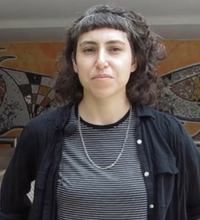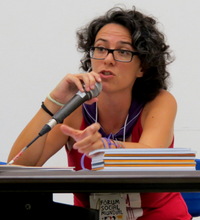This article is based on the lessons learnt during the Feminist Forum against Free Trade and the Great Feminist Assembly held within the framework of the Peoples’ Summit “WTO Out, Building Sovereignty” from 10 to 13 December 2017 in Buenos Aires, Argentina, alongside the XI Ministerial Conference of the World Trade Organization taking place in the same city. Some reflections are also presented on the challenges faced by feminists in view of the agenda of the G20 Summit in 2018.
LESSONS LEARNT
Our societies are affected by the conditions imposed by corporate power in the struggle for resources and the promotion of trade agreements. Consequently this produces tension on the possibilities of local politics. This corporate power increasingly exerts influence on political actors, conditions the decisions of states and erodes the mechanisms of transparency, accountability and alignment with human rights principles.
Here we observe a premise for these troubled times: to transform the agendas imposed by corporate power into opportunities to renew our capacity to resist and build alternatives. This was one of the challenges left by the XI Ministerial Conference of the World Trade Organization (WTO) in Argentina. At the ‘Peoples’ Summit’ the response was unexpected and rich in terms of dialogue and exchange of knowledge in the face of the WTO meeting. In this context, the Feminist Forum against Free Trade was held with the aim of establishing a dialogue between different perspectives and standpoints in the face of the agenda of free trade and the neoliberal advance in Latin America and the global South.
In these times, the second premise holds the principles and lessons learnt which serve as the foundation to be able to face this fierce and tricky world (Sen and Durano, 2015). The experience of the Feminist Forum against Free Trade was built collectively and we were able to review our practices. Therefore we were able to reflect on the conditions in place for this experience, based on a strong, inclusive and ready to listen feminism. To establish dialogues at the Forum it was essential to plan workshops and panels where most women, transgender people and lesbians would be represented and where, far from straining for hegemony as a response, we captured the challenges, tensions and questions.
Based on both premises, the first lesson learnt was to magnify and understand the difficulties faced by social movements, women and feminists to address and own the themes related to economics, particularly with more complex dynamics such as the impact of ‘free’ trade and investment agreements and corporate power, on our lives. At first, these themes seemed to be far from being addressable, yet they were close to our reality. However we were able to have a full auditorium, ready to socialise knowledge and there was a smooth exchange of learning, from theory to grounded experiences. The pressing and ruthless reality we face made the course of the Forum go beyond what was merely relevant in terms of WTO and economic liberalization. It was necessary to discuss the global context of violence against women, criminalisation of sexual dissidence, impunity of corporate power and State collusion in the face of attacks against the rights of humanity and mother earth.
Another lesson learnt from the Forum was the need to share spaces that provide knowledge to understand the reality we face; and to discuss the interests of different sectors and subjectivities. In such spaces we were able to challenge issues and pose questions such as: which economic models are at stake, what are the objectives behind these trade debates and the different impacts they have – so as to be able to have the means to organise ourselves in an emancipatory way.
In this sense, the alternative nature not only of feminist thinking but also of its practical ethics and modes, reflect possible effective ways to deal with these problems through a territorial approach. These strengths help understand the multiple nature of our struggles, oppressions and diverse and creative ways of organising ourselves. Likewise, they create spaces where it is possible to give visibility and work on rising tensions. Importantly, tension built up when the distinctive nature of class and race was brought up. The distinct character of women as workers was widely discussed and showed it was essential to portray multiple and plural models of work, considering not only productive but also reproductive, unpaid care work. A tension that developed as one of the key disputes was over meanings in the #8M (8 March Women’s Day) mobilisations of this year.
THE CHALLENGES OF THE G20 AGENDA
The experience of social organisation against WTO is a powerful platform of action in the face of a new development of “elite multilateralism” 1 (Ocampo, 2011), which is the G20 Summit that will take place by the end of the year in Buenos Aires. In this case, there are formal channels to include women’s perspective and demands, through the specific affinity group (Women20 or W20)2 as well as gender working areas in other affinity groups (such as the Gender Task Force within the T20 or the contributions made by C20 from
this perspective)3.
The W20 has planned four areas of intervention: labor, digital and financial inclusion and rural development. It is important to engage in the different spaces of participation within this structure4 to mainstream the feminist perspective in the recommendations for the decision-making groups, to resist more conventional visions that predominate in a significant share of the prevailing perspectives in this process, and to expose tensions rising between the aspiration to promote women’s rights and the economic policies promoted by governments of G20 member countries. The follow-up of these spaces can also be a way to capture the core issues and languages that are dealt with, recreated and taken.
In this respect, it is important to insist on the need to link the W20 agenda and proposals with the issues being discussed at the ministerial meeting, including the future of work, infrastructure for development and food security. These issues are of vital importance for the lives of women, lesbians and transgender people, and the resistance of social organisation must contribute to expose the threat posed by: i) a future of work based on precariousness of working conditions, reduction of labor rights and the persistent non recognition of reproductive work; ii) the risk of public-private partnerships for the creation and expansion of infrastructure for development concentrated in mega projects that enable businesses with the private sector in a context of barely transparent contract and financial deals, which, at the same time, may result in a restricted access of women to basic social infrastructure and social services; iii) a paradigm of food security that enables market concentration, the commodification of food and despoiling of land that jeopardises food sovereignty and, thus, the livelihood strategies of women, households and peoples.
Once again, it will be necessary to create spaces to express these visions outside official structures that are hardly open to these demands; but also because we can build alternatives in these places ‘on the borders’. The challenge ahead is to recreate these spaces for dissemination of information, training, organisation and active resistance with a remarkable presence of feminisms.
NOTES
1 This is the way Ocampo (2011) refers to intergovernmental groups and institutions with exclusive and ad hoc membership, driven by developed countries that define policies in key areas such as global finance, trade and taxation. These organisations have serious problems of legitimacy. The G20, the Organization for Economic Co-operation and Development (OECD) and the Financial Stability Board (FSB) are examples of elite multilateralism. (Ocampo, J.A. (2011) Reforming the International Monetary System. Helsinki: UNU-WIDER. Annual Lecture 14).
2 The affinity groups are transnational networks of civil society organisations, think tanks, representatives of unions and entrepreneurs, seeking to influence the agenda of the decision-making bodies of the G20. The goal of W20 is to “exert influence on public policies to increase women’s participation in the economies and societies of their countries.” (http://w20argentina.com).
3 The T20 is the affinity group of the so-called “think tanks.” The C20 is the affinity group of civil society.
4 For example, the National Forum of Consultation and Debate held last March 23 in Buenos Aires (http://w20argentina.com/wp-content/uploads/2018/04/programa_4.pdf).
This article is published in the DAWN Informs July 2018.
Leer la versión en español aquí.

(UBA), and member of the Space for Feminist Economics of the Argentinian Society
fro Critical Economy (SEC).

DAWN’s Executive Committee. She is a feminist economist with a PhD in Social Sciences from the Latin American Social Sciences Institute
(FLACSO). She works as a researcher at CONICET and CIEPP in Buenos Aires.

